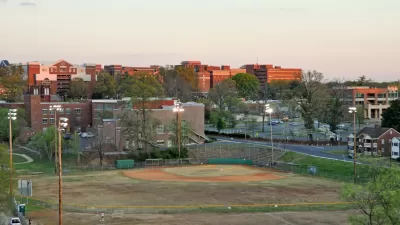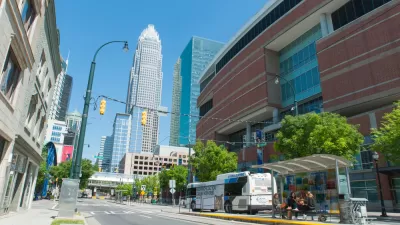Charlotte saw the writing on the wall, and decided to act decisively in addressing its lack of affordable housing options.

J. Brian Charles reports on the city of Charlotte's ambitious efforts to address it housing crisis, most notable by tripling the amount of bond funding for the city's affordable housing trust fund.
"Typically, Charlotte has gone to residents every two years and asked for support in the form of $15 million in bond funding. But in 2018, Charlotte asked for and received voter approval for $50 million in bond funding," according to Charles.
"The city will use some of its additional bond money to acquire property adjacent to transit and commercial centers, pair the housing trust fund dollars with federal Community Development Block Grant funds to create mixed-income housing, expand the development of rental housing through Low-Income Housing Tax Credits, and ensure that publicly funded developments set aside at least 20 percent of units for families earning less than 30 percent of the area’s median income."
According to Charles, two events caused the city's more ambitious approach to affordable housing in the city: 1) a 2014 study [pdf] ranking the city dead last among the nation's 50 largest cities in economic mobility and 2) a 2016 killing of an African-American man named Keith Lamont Scott by Charlotte police officers.
As a result, "[t]he city and its surrounding county formed the Charlotte-Mecklenburg County Opportunity Task Force. The work of the task force culminated with a report released last summer [pdf], which called for a new, more multipronged approach to increasing affordable housing."
FULL STORY: Affordable Housing Crisis Reaches a Tipping Point in Charlotte, N.C.

Planetizen Federal Action Tracker
A weekly monitor of how Trump’s orders and actions are impacting planners and planning in America.

Maui's Vacation Rental Debate Turns Ugly
Verbal attacks, misinformation campaigns and fistfights plague a high-stakes debate to convert thousands of vacation rentals into long-term housing.

San Francisco Suspends Traffic Calming Amidst Record Deaths
Citing “a challenging fiscal landscape,” the city will cease the program on the heels of 42 traffic deaths, including 24 pedestrians.

Defunct Pittsburgh Power Plant to Become Residential Tower
A decommissioned steam heat plant will be redeveloped into almost 100 affordable housing units.

Trump Prompts Restructuring of Transportation Research Board in “Unprecedented Overreach”
The TRB has eliminated more than half of its committees including those focused on climate, equity, and cities.

Amtrak Rolls Out New Orleans to Alabama “Mardi Gras” Train
The new service will operate morning and evening departures between Mobile and New Orleans.
Urban Design for Planners 1: Software Tools
This six-course series explores essential urban design concepts using open source software and equips planners with the tools they need to participate fully in the urban design process.
Planning for Universal Design
Learn the tools for implementing Universal Design in planning regulations.
Heyer Gruel & Associates PA
JM Goldson LLC
Custer County Colorado
City of Camden Redevelopment Agency
City of Astoria
Transportation Research & Education Center (TREC) at Portland State University
Jefferson Parish Government
Camden Redevelopment Agency
City of Claremont





























